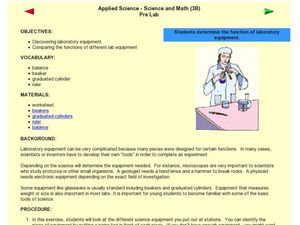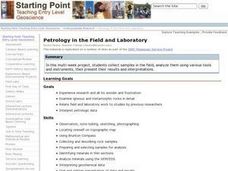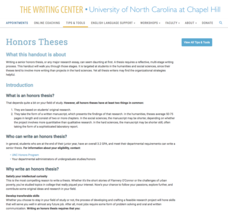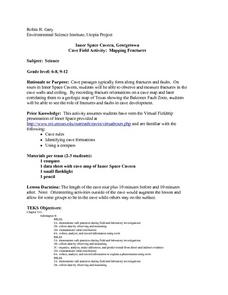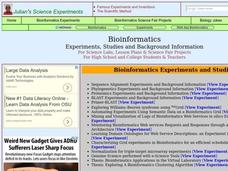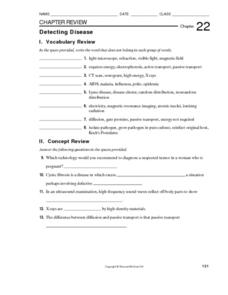Curated OER
UP AND ATOM
If you are willing to sort through this outline and overlook the portions relating to inaccessible videos, you will find a wealth of support for your introductory chemistry unit. Narrative is presented to help you help learners navigate...
Curated OER
Computer Software and ACS Materials for Chemistry
Students use computer software to simulate chemistry laboratory experiments. In this experimenting using computer software lesson plan, students use software called "The One Computer Classroom" to investigate wave simulations as a whole...
Curated OER
Archaeology
In this archaeology activity, students answer 8 questions about archaeology. For example, "How are most archaeological sites discovered?"
Cornell University
Splitting Water with Electricity
Explore how electricity splits water molecules into hydrogen and oxygen. Learners begin by calculating the voltage necessary to separate the water. They then perform the experiment and measure the ratio of hydrogen and oxygen bubbles.
Curated OER
Applied Science -- Science and Math (3B) Pre Lab
Set up stations around your science lab to introduce youngsters to different equipment. They examine a beaker, graduated cylinder, ruler, balance, and thermometer. The said worksheet is not included, but you will find a few useful tips...
Virginia Department of Education
Properties of Compounds and Chemical Formulas
Young chemists have unknown compounds they need to sort. Performing three different tests on each, the chemical behaviors they observe become the basis for data analysis.
Curated OER
Petrology in the Field and Laboratory
Students collect samples in the field, analyze them using various tools and instruments, then present their results and interpretations. They examine igneous and metamorphic rocks in detail and interpret petrologic data.
Curated OER
Living in the Oak Woodlands: Early People of the Jewett Mine Area
Students are introduced to the early peoples living in the Jewett Mine area. After viewing transparencies, they view pictures of the mine today and its main area of production. For each picture, they develop symbols and captions about...
University of North Carolina
Honors Theses
For those enrolled in a college honors program, four years of hard work culminate in one paper—an honors thesis. A handout outlines the steps to writing the paper, beginning with a sample timetable and time management instructions. Once...
Curated OER
Introduction to Scientific Method
Students investigate safe laboratory procedures, classroom management guidelines, and group roles and procedures. They study a set of safety guidelines with their parents, and to sign a contract stating that they understand the...
Curated OER
Trichinella Forensics
Young scholars engage in DNA manipulation using forensics techniques. Students investigate topics involved in forensics studies such as cloning, electrophoresis, gene mapping, replication, and transcription.
Curated OER
Cave Activity: Mapping Fractures
Students tour a cave and observe fractures in the cave's ceiling. They record characteristics of the fracture. They locate three major passages in the cave and ten major fractures.
Curated OER
Funky Fomites and Aseptic Microbiology Techniques for Bacterial Isolation
Students listen to a lecture on the purpose of practicing aseptic technique as well as an explanation of how to practice them. They practice aseptic technique by plating bacteria in order to isolate individual colonies of bacteria. They...
Curated OER
History of Chemistry: The Alchemists
Young scholars research alchemy and the history of chemistry. In this chemistry history lesson, students examine laboratory apparatus and compare it to those used by the Alchemists. Young scholars complete a research paper on an...
Curated OER
What Influences Reaction Rate?
Students study reaction rates, what determines how fast a reaction happens and how the chemical changes occur. In this reactions instructional activity students complete a lab where they use Alka-Seltzer to observe reaction rate and...
Curated OER
Bioinformatics
Students conduct a series of scientific investigation using bioinformatics. In this molecular biology lesson, students collect experimental data using different educational softwares. They calculate and analyze relationships using...
Curated OER
Animal Skin
Young scholars investigate the skin surface to body area ratios for different animals. In this seventh/eighth grade mathematics/science lesson plan, students explore heat transfer between an animal’s body and the environment. Using...
Curated OER
Graphing Data from the Chemistry Laboratory
Students graph and analyze data using a spreadsheet.
Centers for Ocean Sciences
Ocean and Great Lakes Literacy: Principle 1
Is your current lesson plan for salt and freshwater literacy leaving you high and dry? If so, dive into part one of a seven-part series that explores the physical features of Earth's salt and freshwater sources. Junior hydrologists...
University of Georgia
Splat!
What does viscosity have to do with splatter? An activity shows that the viscosity of a substance is inversely proportional to the distance of its splatter. Learners conduct the experiment by collecting data, graphing, and analyzing the...
University of Georgia
Using Freezing-Point Depression to Find Molecular Weight
Explore the mathematical relationship between a solvent and solute. Learners use technology to measure the cooling patterns of a solvent with varying concentrations of solute. Through an analysis of the data, pupils realize that the rate...
Curated OER
Detecting Disease
In this detecting disease worksheet, students will review the different tools scientists use to identify diseases including the steps of Koch's postulates. This worksheet has 14 fill in the blank and 4 short answer questions.
University of Georgia
Stoichiometry of S'mores
How fun would it be to teach the concept of stoichiometry while allowing your chemistry class to assemble a classic campfire treat? This fun and engaging activity allows pupils to explore the principles of the chemical theory while...
Virginia Department of Education
Solution Concentrations
What happens when you combine 6.022 times 10 to the 23 piles of dirt into one? You make a mountain out of a mole hill. Scholars use dehydration to obtain percent composition and then calculate the molarity of the original solution.






